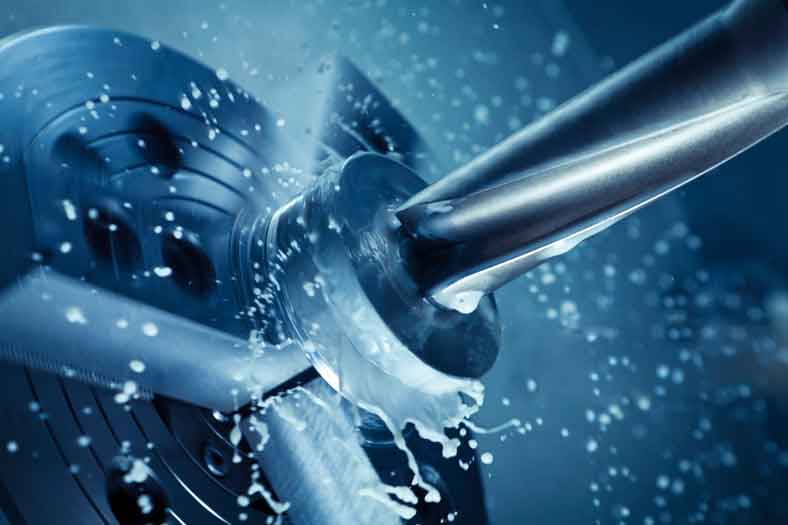Leveraging technologies for machine tools manufacturing
By OEM Update Editorial February 8, 2020 12:41 pm IST
The Indian machine tools market is growing steadily, and companies are getting ready to boost growth further to make India a centre of manufacturing excellence. Read on about the trends and technologies that will impact the industry this year.
The machine tool market in India has grown in significance over the last few years. With surge in demand from other industries such as automotive, capital goods, aerospace and defence, railways, and others, the sector has become a full-fledged market that is adopting the latest technologies for increased production and productivity and reduced cycle time. Customers want high-quality products quickly that meet their specifications, so companies are now adapting their operations to ensure lower turnaround time and better quality, precision, and safety.
As per Gardner’s “World Machine Tool Output Survey 2018”, India stands 8th in consumption and 10th in production of machine tools in a global list of world machine tool consuming and producing countries. Moreover, a recent report by Fortune Business Insights™ estimates the global metal forming machine tools market size to reach $48.67 billion by 2026. With such optimistic figures, it is imperative for machine tool companies in India to seize the opportunities in the market to boost their growth and thereby develop India as a leading supplier and exporter of machine tools that meet international standards.
Vikas Ghai, Managing Director, GVK Metalforms Pvt. Ltd. says, “We are looking forward to an increase in localised manufacturing, with better products and raw materials to work with. When there are high-quality resources, people need to put less effort in manufacturing and we can supply better quality products to customers. This will also allow us to use our manpower in developing in R&D rather than reworking and correcting our mistakes. Thus, we manufacturers can produce good-quality products that meet customer specifications in a single attempt.”
Technological disruption
Technologies like artificial intelligence (AI), industrial automation, IoT, smart factories, and robotics are being increasingly adopted by domestic machine and CNC tool manufacturers to meet competition from both the Indian players as well as global giants. Machine tool companies, being heavily dependent on technologies, need to harness the benefits of the new and modern technologies that are designed to make manufacturing easier and quicker.
Vineet Seth, Managing Director – South Asia & Middle East, Mastercam APAC, says, “AI, industrial automation, IoT, smart factories, and robotics are relatively newer technologies and largely depend on the benefits that companies will derive after building a robust and wide (time-related) database of their processes. A large number of industries have already put industrial automation and robotics into practice in the past decade or so, and continue to benefit from the consistency, reliability, and flexibility of these systems. Smart factories are an integration of all the above technologies and integrating them into operations, which help the invested company deliver meaningful results to internal as well as external stakeholders, in a seamless manner. The Indian CNC industry is very progressive in its approach and is known to adopt best practices as well as relevant new technologies quickly. I’m sure that they will continue to grow from strength to strength.”
Nilesh Chanchad, Director, Chanchad Machine Tools Company says, “We are now embracing the demands and needs of the new generation by joining hands with technology to make our processes faster. The new generation wants automation and faster production because nowadays procurement of skilled labour and other resources has become very difficult. So, in the Indian market, the scenario is changing. People are moving from old technologies which operated manually to NC machine control units, CNC machine control units, and automation. So there is definitely a good future for automation in the Indian market.”
Niraj Seth, President, Amada (India) Private Limited, shares, “IoT is something which people are talking about now. But when one looks at Amada’s development, we were IoT-enabled around eight years ago. Back then, we were already into the concept of virtual prototype simulation system (VPSS). So, all our machines communicate with each other.”
According to Vasant B Vibhute, Managing Director, Givi Misure Pvt. Ltd., automation and IoT are in the stage of infancy in India. He explains, “Every company is now wishing to adopt them. They have many advantages, but the technology is very new, so people are afraid to invest heavily. Nonetheless, there are plenty of opportunities that are arising in the Indian industry because of these technologies. They have been developed for the manufacturing sector, and machine tool is an important manufacturing sector. Automation and IoT will help machine tool companies meet customers’ obligations and manufacture products as per their specifications.”
Amar Kulkarni, Vice President – Sales, Polyworks India, adds, “Everyone is moving towards Industry 4.0 and IoT because they understand that data has the power and ability through which the management or people can take decisions using that data. Earlier, decisions were taken through one’s expertise that came from experience or judgment, which was more similar to estimation. But now we have data. We have machines that can collect data, and we have software that can take this data, compile it and present it in an easy and convenient format. This is helping manufacturing companies to take faster and more accurate decisions.”Impact of trends in automotive industry on machine tools
One of the major industries that contribute to machine tools is the automotive industry. But the recent slowdown in automotive is a cause for concern for certain machine tool manufacturers. Seth says, “Mastercam has customers across diverse domains, including the automotive sector. While we haven’t seen a significant impact in the other domains, sales to automotive OEMs and their supply chain has certainly had a mentionable impact. Having said so, we grew in double digits in 2019 — largely due to projects from 2018 and before, with a lot of machine tools being delivered in 2019 to the automotive sector. With the upcoming BSVI norms and electrification discussions, I find that we are not shy of opportunities in 2020 as well.”
AV Srinivasan, CEO, Meiban Engineering Technologies Pvt Ltd, explains, “The present trends in the automotive industry are affecting our business to the extent that the domestic automotive component manufacturers are still reluctant to invest in machine tools. However, we are able to concentrate on companies that are into export business and are manufacturing certain high-technology products. But nevertheless, the market is certainly subdued right now.”
Recent innovations in the CNC and machine tools market
New product developments are instrumental in pushing the machine tool industry forward even as certain industries are in a slump. Vasant B Vibhute, Managing Director, Givi Misure Pvt. Ltd. explains, “The Indian market is valued at about Rs 20,000 crore, out of which 60 percent of the market segment is contributed to by imports from Italy, Germany, France, the UK, America, Taiwan, China, Japan, etc. Now, if we want the export market to grow from 40 percent to 60 percent, Indian machine tool manufacturers have to focus on high-precision machines, high-productivity machines, and high-quality machines. Only if we produce such machines can we cover the gap and boost domestic manufacturing.”
Seth tells us, “We have been seeing an increasing trend in investments in multitasking machines. Typically, Turn-Mills, Mill-Turns and Multi-Axis machines with turning capability are what customers are currently procuring. Machine makers are now focusing on the per sq ft utilisation of a machine tool, given escalating real estate rates in certain cities as well as the ability to machine a components on a single station, to the best permissible extent, technically.”
Seth elaborates that hybrid-additive and subtractive machines are also what the industry considers “hot” currently. Low-torque high speed milling machines are also finding their place in the market; these are typically focused towards the small part, high-precision die and mould markets. In addition to the above, machine tool controllers are ever advancing. With real-time tool path simulation to advanced geometry control, new age controllers are taking the next step.
A new era of growth
Niranjan Manjrekar, General Manager – Indian Operations, LVD-Strippit India Pvt. Ltd., says, “The way I see the industry segment-wise, I have seen good growth in aerospace, medical equipment, defence, and infrastructure. The aerospace sector is relatively new and challenging in the present market scenario. We are dealing with different kinds of materials which are high-tech and demand better technology through better machines as well as better tooling. Also, nowadays, people don’t just want machines or tools; they want a solution for a particular part or project. People now are talking more about the functionality or features of a product which were never spoken of before. People know which kind of products is available with what functionality, features, and flexibility. From an end user perspective, there has been a big change. So, machine tooling and automation comes as a complete package now to cater to the changing market needs. Moreover, the demand for good quality machines is going up. So, I am very optimistic for the coming two years.”
Srinivasan adds, “In the next three to five years, we want India to grow. We are positive about the next three years at least with regard to the country’s growth.”
Seth concludes, “We continue to hold a positive outlook for 2020. We have finished 2019 on a high and would like to carry the same into the new year. Our core strengths are our software and people; we remain committed to make investments in both, to help our customers win.”
We are dealing with different kinds of materials which are high-tech and demand better technology through better machines as well as better tooling.
Niranjan Manjrekar, General Manager – Indian Operations, LVD-Strippit India Pvt. Ltd.
IoT is something which people are talking about now. But when one looks at Amada’s development, we were IoT-enabled around eight years ago.
Niraj Seth, President, Amada (India) Private Limited
A large number of industries have already put industrial automation and robotics into practice in the past decade or so, and continue to benefit from the consistency, reliability, and flexibility of these systems.
Vineet Seth, Managing Director – South Asia & Middle East, Mastercam APAC
People are moving from old technologies which operated manually to NC machine control units, CNC machine control units, and automation.
Nilesh Chanchad, Director, Chanchad Machine Tools Company
When there are high-quality resources, people need to put less effort in manufacturing and we can supply better quality products to customers.
Vikas Ghai, Managing Director,GVK Metalforms Pvt. Ltd.
Everyone is moving towards Industry 4.0 and IoT because they understand that data has the power and ability through which the management or people can take decisions using that data.
Amar Kulkarni, Vice President – Sales, Polyworks India
Automation and IoT will help machine tool companies meet customers’ obligations and manufacture products as per their specifications.
Vasant B Vibhute, Managing Director, Givi Misure Pvt. Ltd.
The present trends in the automotive industry are affecting our business to the extent that the domestic automotive component manufacturers are still reluctant to invest in machine tools.
AV Srinivasan, CEO, Meiban Engineering Technologies Pvt Ltd
Cookie Consent
We use cookies to personalize your experience. By continuing to visit this website you agree to our Terms & Conditions, Privacy Policy and Cookie Policy.


















